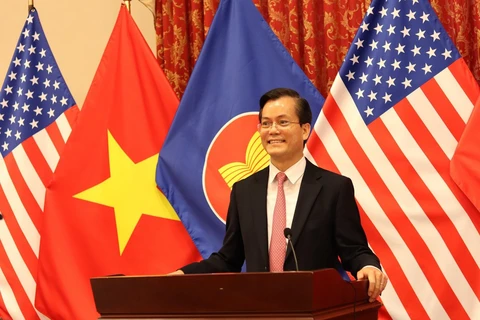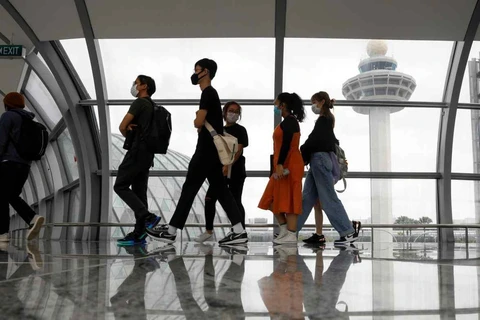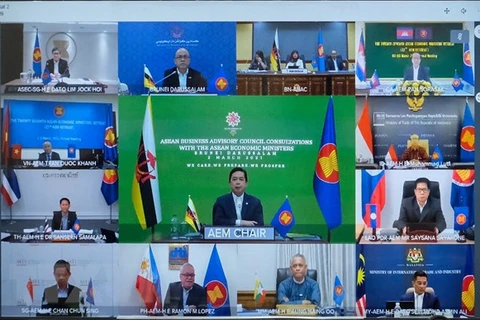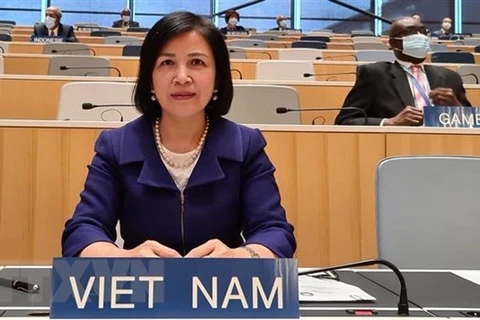Jakarta (VNA) – The Association of Southeast Asian Nations (ASEAN) on March 8 launched the ASEAN Regional Study on Women, Peace and Security which presents evidence-based recommendations to support member states in enhancing women’s meaningful participation in peacebuilding and conflict prevention, resolution, and post-conflict processes, in line with regional and international commitments.
The study is a collaboration between ASEAN, the United States (US) government through the US Agency for International Development (USAID), and UN Women.
In remarks at the launch ceremony, ASEAN Secretary-General Dato Lim Jock Hoi said: “To commemorate International Women’s Day 2021, we are pleased to share this first regional study on Women, Peace and Security in ASEAN to reaffirm our commitment to gender equality, women’s leadership, and its integration into the ASEAN Comprehensive Recovery Framework and the ASEAN Vision post 2025.”
“This study establishes a solid evidence base to guide our efforts in advancing the Joint Statement on Promoting Women, Peace and Security in ASEAN in the years ahead,” he emphasized.
Led jointly by the ASEAN Committee on Women (ACW) and the ASEAN Commission on the Promotion and Protection of the Rights of Women and Children (ACWC), the study was conducted throughout 2020 with support from USAID through the PROSPECT project, ASEAN Secretariat and UN Women.
The main objective, as explained by Dr. Ha Thi Minh Duc, a member of the Advisory Group coordinating the study, was to move from “recognition” of the importance of women’s participation in peacebuilding, conflict prevention, and conflict resolution to its “realisation” in the region, where conflict and security challenges vary widely across member states.
The resulting Regional Study takes stock of progress and challenges across member states, consolidates lessons learned, and proposes a common understanding and concrete recommendations for ASEAN stakeholders on WPS.
During the virtual launch ceremony, ASEAN Member State representatives took note of the study’s findings and recommendations and proposed working toward the formulation of a multi-sectoral Regional Plan of Action to implement the Women, Peace and Security agenda. The UN and ASEAN dialogue partners, including Australia, Canada, and the US supported the proposal and committed to assist ASEAN with future coordination and capacity building initiatives.
Congratulating ASEAN for the achievement, Melissa A. Brown, Chargé d’Affaires, a.i. of the U.S. Mission to ASEAN, remarked: “Not only does this study serve as a comprehensive resource for ASEAN, it is also a promising step that underscores ASEAN’s unwavering commitment to the WPS agenda.”
“Alongside ASEAN, the UN, and other partners here, the US looks forward to continuing our collaboration to promote and strengthen women’s meaningful participation in peacekeeping efforts, security cooperation, and all peace and security decision-making processes across the region.”
Mohammad Naciri, Regional Director of UN Women Regional Office for Asia and the Pacific said: “Advancing WPS agenda in ASEAN is even more relevant in the COVID-19 response and recovery in the region.”
“The pandemic is a conflict multiplier and presents a threat to international peace and security. Women play a critical role in conflict prevention, resolution and recovery. WPS highlights the importance of gender-responsive policy to address the impact of COVID-19 and to ensure meaningful empowerment of women in the region. UN Women is committed to support ASEAN in this effort.”/.
The study is a collaboration between ASEAN, the United States (US) government through the US Agency for International Development (USAID), and UN Women.
In remarks at the launch ceremony, ASEAN Secretary-General Dato Lim Jock Hoi said: “To commemorate International Women’s Day 2021, we are pleased to share this first regional study on Women, Peace and Security in ASEAN to reaffirm our commitment to gender equality, women’s leadership, and its integration into the ASEAN Comprehensive Recovery Framework and the ASEAN Vision post 2025.”
“This study establishes a solid evidence base to guide our efforts in advancing the Joint Statement on Promoting Women, Peace and Security in ASEAN in the years ahead,” he emphasized.
Led jointly by the ASEAN Committee on Women (ACW) and the ASEAN Commission on the Promotion and Protection of the Rights of Women and Children (ACWC), the study was conducted throughout 2020 with support from USAID through the PROSPECT project, ASEAN Secretariat and UN Women.
The main objective, as explained by Dr. Ha Thi Minh Duc, a member of the Advisory Group coordinating the study, was to move from “recognition” of the importance of women’s participation in peacebuilding, conflict prevention, and conflict resolution to its “realisation” in the region, where conflict and security challenges vary widely across member states.
The resulting Regional Study takes stock of progress and challenges across member states, consolidates lessons learned, and proposes a common understanding and concrete recommendations for ASEAN stakeholders on WPS.
During the virtual launch ceremony, ASEAN Member State representatives took note of the study’s findings and recommendations and proposed working toward the formulation of a multi-sectoral Regional Plan of Action to implement the Women, Peace and Security agenda. The UN and ASEAN dialogue partners, including Australia, Canada, and the US supported the proposal and committed to assist ASEAN with future coordination and capacity building initiatives.
Congratulating ASEAN for the achievement, Melissa A. Brown, Chargé d’Affaires, a.i. of the U.S. Mission to ASEAN, remarked: “Not only does this study serve as a comprehensive resource for ASEAN, it is also a promising step that underscores ASEAN’s unwavering commitment to the WPS agenda.”
“Alongside ASEAN, the UN, and other partners here, the US looks forward to continuing our collaboration to promote and strengthen women’s meaningful participation in peacekeeping efforts, security cooperation, and all peace and security decision-making processes across the region.”
Mohammad Naciri, Regional Director of UN Women Regional Office for Asia and the Pacific said: “Advancing WPS agenda in ASEAN is even more relevant in the COVID-19 response and recovery in the region.”
“The pandemic is a conflict multiplier and presents a threat to international peace and security. Women play a critical role in conflict prevention, resolution and recovery. WPS highlights the importance of gender-responsive policy to address the impact of COVID-19 and to ensure meaningful empowerment of women in the region. UN Women is committed to support ASEAN in this effort.”/.
VNA
























